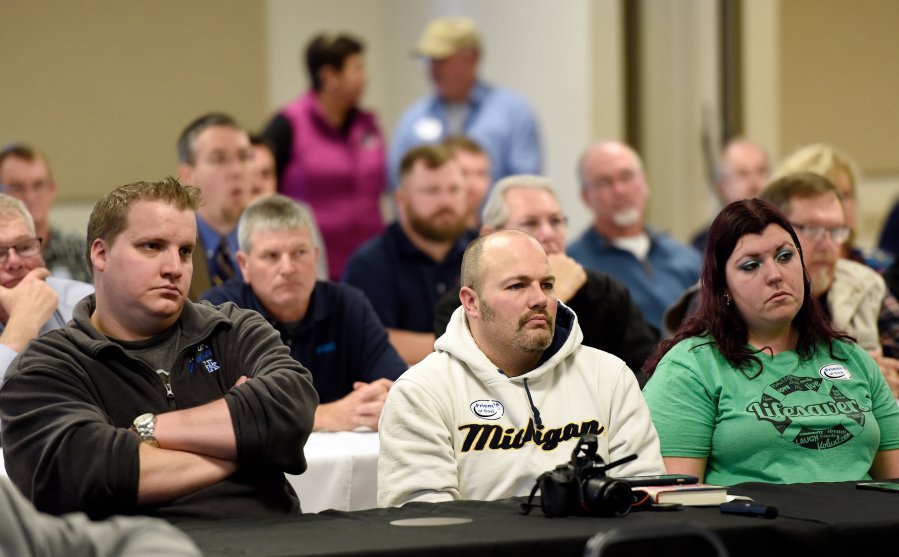Rand Paul Would Accept Government Shutdown to Fight EPA

By Chuck Stinnett
November 27, 2015 - Presidential candidate and U.S. Sen. Rand Paul said this week that a government shutdown might be necessary to slash funding for the U.S. Environmental Protection Agency and cripple the Clean Power Plan and other new safety and environmental regulations.
"Maybe if we kept it closed for a few days or a few weeks," Paul told an audience of about 200 people at the John A. Arnold Convention Center at the Union County Fair and Expo Center who gathered for an hourlong event described as a Western Kentucky coal forum.
The Bowling Green Republican is among the Kentucky elected officials unhappy that the Obama administration has developed new regulations they say is hurting the state's coal industry and could jeopardize Kentucky's historic competitive advantage of offering cheap electricity.
"I think the time to talk is over and the time to resist is here," Paul said, though he added: "I'm not sure we're ready for civil disobedience."
He proposes a two-prong response: challenge the Clean Power Plan regulations (to reduce carbon emissions) in court and, in the meantime, defund EPA's ability to enforce them.
To accomplish the latter, the libertarian advocates allowing the federal government to shut down so Congress could pass bills to re-engineer its budget instead of passing another continuing resolution.
Paul criticized Democratic and Republican lawmakers alike for compromising on a resolution in late September to continue funding the government through Dec. 11.
"I'm willing to shut it down and let it all expire" so the Republican-controlled Congress can start federal funding over from scratch, he said.
He later retreated from showing actual enthusiasm for a shutdown, instead emphasizing that Congress needs to rebalance the balance of power that was intended between the executive and legislative branches of government.
"I have no power at all over these regulations" since they were promulgated by the EPA rather than Congress, Paul said.
"All this power has gravitated to the presidency," he said.
Attorneys general in 27 states, including Kentucky's Jack Conway, have sued the EPA to challenge the legality of what Paul said could be the most expensive set of regulations in history.
However, David Moss of the Kentucky Coal Association said that litigation could take 2½ years or more to resolve. By that time, the nation's electric utilities could have already made the transition to shift largely from coal to natural gas or renewable energy sources.
Companies such Big Rivers Electric Corp., Kentucky Utilities Co. and the Tennessee Valley Authority have already announced plans to use more natural gas in the future. Big Rivers plans to convert one small coal plant to gas while KU and TVA are building new gas plants to replace older, dirtier coal plants.
Paul also noted that if a Republican candidate wins the presidency next year, "On Day 1, the (new) president could repeal everything the president has done."
Meanwhile, Heath Lovell, vice president of Alliance Coal, which is Western Kentucky's largest producer, decried the step-up in enforcement of mine safety regulations by the federal Mine Safety and Health Administration. One of his mine safety directors was unable to attend the forum because "he had nine inspectors show up" on Tuesday morning.
Paul suggested that with so many mines having shut down in the past two years, the inspectors might have had nowhere else to be.
In another matters, the senator advocated for lowering the tax burden for companies.
"We have the highest corporate income tax in the world," he declared. (The Tax Foundation specifies that the U.S. general top marginal corporate tax rate, at 39.1 percent, is third-highest in the world, although highest among the world's 34 industrialized nations.)
"We have companies reincorporating in other countries," such as Burger King moving its headquarters to Canada and pharmaceutical giant Pfizer announcing Monday it will relocation to Ireland, Paul noted.
He has proposed replaced the IRS tax code with a 14.5 percent income tax on individuals and businesses, in part to encourage corporations to remain based in the U.S. and bring home their vast profits from foreign sales.

Republican presidential candidate and U.S. Senator Rand Paul gestures as he speaks at Tuesday's Western Kentucky coal forum in Sturgis, Kentucky, November 24, 2015

Attendees at Tuesday's Western Kentucky coal forum listen to Republican presidential candidate and U.S. Senator Rand Paul speaking, November 24, 2015

